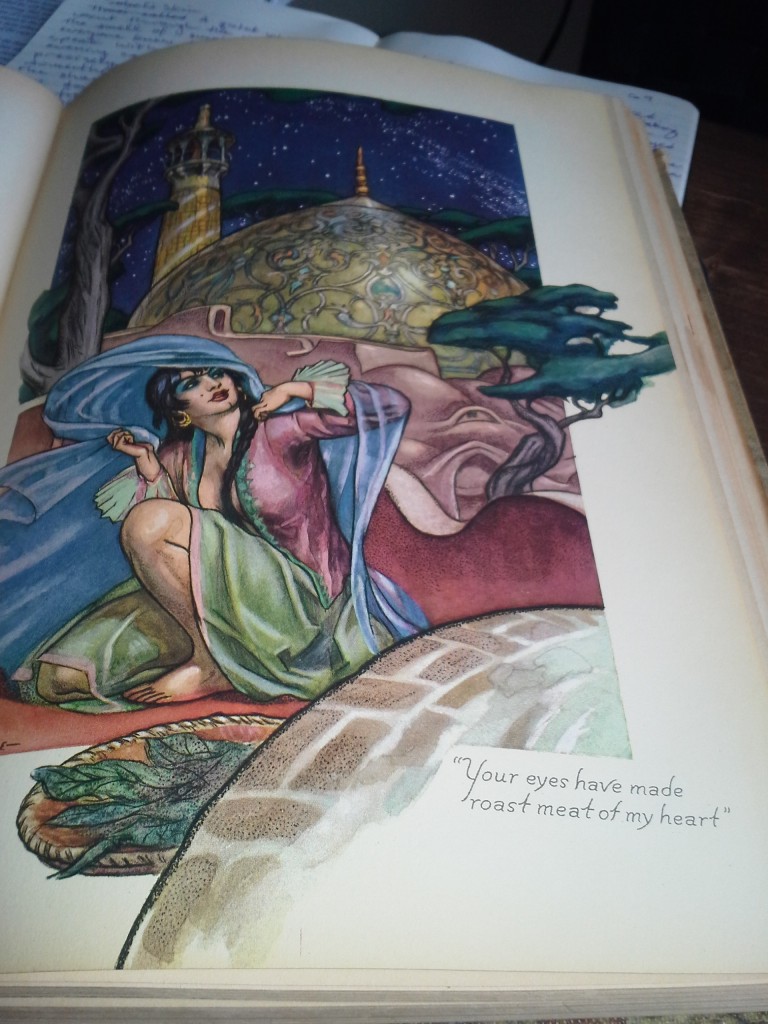Arabian Tales
You may remember that last summer I was pretty excited about G. Willow Wilson’s debut novel, Alif the Unseen. You can read my earlier thoughts on Alif, or just read the book – it’s out in paperback now. Briefly, it is genre-bending urban political fantasy magical realism which presaged the various recent revolutions of the Middle East.
Part of the plot of Alif involves a book called the 1001 Days, which may or may not be a fake written by a European. Last year I got a copy of another such book – a little younger, a little less magic involved in the plot, but an excellent read. The Adventures of Hajji Baba of Ispahan was written by James Morier, who was of Swiss-Dutch extraction.
Okay, I’ll be honest. I bought it from an Etsy seller because the listing included this illustration and the caption amused me to no end.
- “Your eyes have made roast meat of my heart”
Hajji Baba is one of those characters who are forever getting into scrapes, generally because his own plotting goes poorly. According to my Wikipedia research, that makes his adventures an example of the picaresque novel, from the Spanish “picaro” meaning “rogue” or “rascal.” Despite his moral failings, Hajji Baba manages to work his way up, as well as back and forth across the Persian Empire in an entertaining fashion. During my undergrad days as a Russian major, I read a lot of literature from the northern side of Caucauses, where the Russian Empire was doing its best to gain control and protect the Christian groups from the Islamic groups (see also, Chechnya, Southern Ossetia). It was interesting to see a bit of the history from the other side — Chapter XLI: He Describes An Expedition Against the Russians, And Does Ample Justice To The Cowardice of His Chief shows our hero interacting with Christian Armenians.
This is one of those books that was very popular in its time (it was first published in 1823), and controversial as well. The picture it paints of the “Mohamedans” is not necessarily a positive one, and when it was translated into Persian, Morier lost some of diplomatic connections. On the other hand, it reportedly confused some Persians who were sure it must have been written by a Persian, on account of its accuracy and insight into the culture. To me, some of the stereotypes presented were familiar since I grew up with Disney’s version of Aladdin. In any case, I think it is a book which deserves to be rediscovered despite its antiquated worldview. If you like well-decorated dead trees, definitely grab the 1937 edition with illustrations by Cyrus LeRoy Baldridge. I overpaid for my copy, because there are people selling it on Amazon for under $5, but it has that lovely old book smell, so I don’t care. If you just want the buckling of swashes, wooing of women, and general adventure, you can read the text off of Gutenberg in the usual formats.
I have been searching for another book I have, called Arabian Nights and Days. It was written by Egyptian author Naguib Mahfouz, and I took it off the shelf when I was writing about Alif, failed to mention it in that review, and, apparently, failed to return it to the shelf. But the author is a Nobel prize winner, the novel continues with characters from the 1001 Nights, I enjoyed reading it and I wish I could find it. I could grab a copy from the library, but that would be admitting that I lost mine.
For other contemporary options, I have had two recently on my list. The first was Saladin Ahmed’s Throne of the Crescent Moon, which follows the adventures of the last real ghul hunter in the great city of Dhamsawaat, along with his dervish assistant, Raseed bas Raseed, who seems to be the Middle Eastern equivalent of a martial monk, and a were-lioness. Regretfully, I didn’t finish it, but it did serve as a good reminder to check my own writing and make sure that my characters fall in love on a realistic timeline, and don’t get distracted in life or death situations by how nice that attractive person of the opposite sex smells! From Goodreads, others have enjoyed it, but I’m saving my hopes now for The Golem and the Jinni by Helene Wecker, which purports to be the tale of friendship between the titular beings, who are newly emigrated to 19th century New York. Dang, that sounds awesome. It also makes me want to reread Neil Gaiman’s American Gods. And, of course, there are the stories of the 1001 Nights, which I know I read some of as a child, but certainly not all of them… There’s a reason why people keep repeating that old saw about ‘so many books, so little time’ — it’s entirely true. I keep trying though, which is why I very nearly forgot one other bit of story-art: Persepolis. An Iranian graphic novel which became a movie. The film was beautiful, and I expect the graphic novel is too, so if you’re making a list from this post, add that one too!
